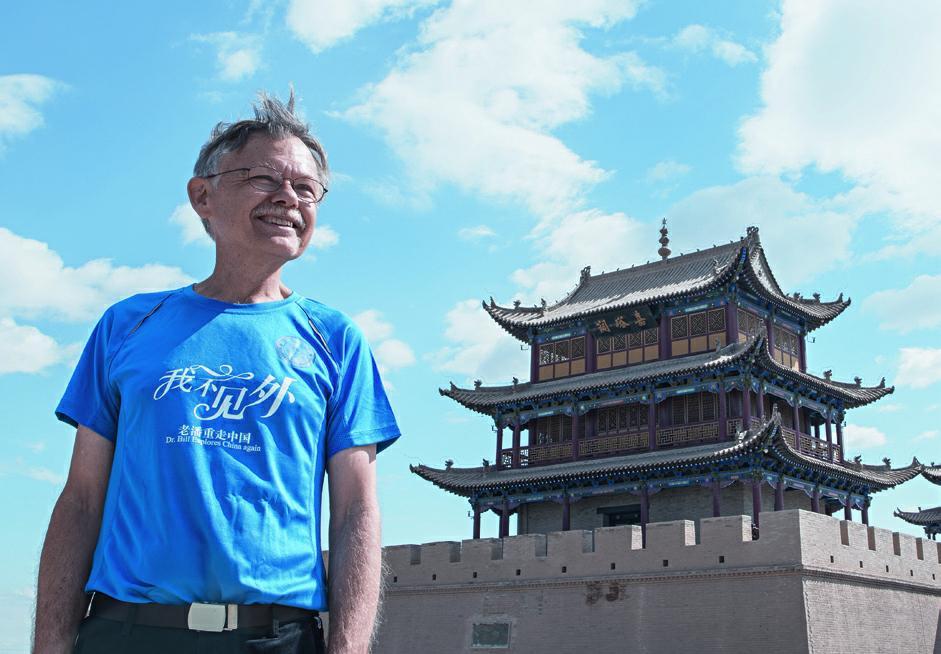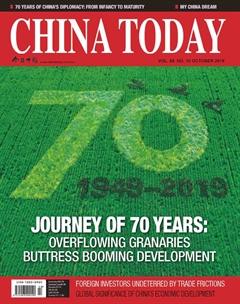My China Dream
By BILL BROWN

Editors note: Bill Brown is a common household name to most of Xiamen people, who affectionately call him “Lao Pan.” In 1988, Bill and his family came to Xiamen, where he has taught MBA courses for the past three decades. In 1992, he became Fujian Provinces first foreigner to receive permanent residence, and in 1993, was given Chinas Friendship Award. In February 2019, after the publication of his new book Off the Wall – How We Fell for China, Bill received a kind reply from Chinas President Xi Jinping in response to a letter he had sent to the president. After Bills trip around China in last August, we invited him to share his feelings and most impressive experiences about this trip.
WHEN my family came to Xiamen for the first time in 1988, I quickly fell in love with China and became a foreign teacher at Xiamen University. At that time, the living conditions were harsh. Every day, the running water was out once or more, power outages were frequent, and transportation wasnt convenient. But even though the situation was not very good for us, the people were so warm, friendly, and hospitable.
Before coming to China, I discovered China Reconstructs, the magazine whose name later changed to China Today in 1990, at a bookstore in Los Angeles China Town. Through the magazine I learned a lot about China. In order to get acquainted with the real China, I decided to travel around China in my own way. So in 1994, I drove with my wife and sons all around China. We drove up the coast to Hangzhou, Suzhou, Nanjing, and Qingdao, over to Beijing, down to Xian, to Qinghai, Tibet, through Yunnan and south China, and back to Xiamen, so pretty much most of the country. It took us three months and we traveled 40,000 kilometers in total.
Teaching to Fish
I drove around China to see if reforms truly benefited all parts of the country. To my surprise, China had already begun building new roads, schools, and medical centers even in remote villages.
From a humanitarian standpoint, it was impressive, but as a business professor, I wondered how the government would ever recoup such massive investments in remote, sparsely populated areas. I finally realized that Chinas leadership had a very farsighted perspective on poverty alleviation. The ancients said, “Give a hungry person a fish and they eat one day; teach them to fish and they eat for a lifetime.” Simply doling money to such a large population would not address the root of poverty, and might make it even worse if people became dependent upon aid. Improved infrastructure and living conditions, however, gave people hope of lifting themselves out of poverty.
Chinas great changes over three decades have also given me great faith in the leadership of the Chinese government. In 1994, for example, it took me three months to drive 40,000 kilometers, but today China has the worlds most extensive highway system and highspeed train network. Three decades ago, power and water were out weekly, sometimes daily, even in coastal cities like Xiamen. Today, farmers in remote mountain villages laughed when I asked if they ever had power outages. In 1991,I spent US $450 and waited three years to get a home telephone. Today, even farmers in remote Tibetan and Inner Mongolian villages have cell phones and access to the Internet, and they buy and sell goods online. The changes are nothing short of miraculous.
But even with Chinas track record, Chinese President Xi Jinpings vow to eradicate poverty by 2020 was so surprising that in 2019 I decided to drive around China again to see just how much progress had been made over the past 25 years. Although everyone knows Chinas miraculous economic statistics, I wanted to put real faces to the numbers – to interview people in every corner of the country to see if their lives had changed. What I discovered astonished not only me but the Chinese who made the trip with me.
I planned to drive around China alone but leaders of Xiamen Universitys School of Management (SMXMU) were concerned about my safety and health and provided a car and driver. “Youre not 38 this time, youre 63!” they reminded me. We ended up with several cars and a dozen people, including SMXMU leaders, Teacher Jie, Doctor Liu, student assistants, New Channels Miss Wang, whom CEO Hu Min provided to help with interviews, and a Fujian Television video production crew. Our team also included Zhu Qingfu, an award-winning Fujian photographer, and the tunnel expert CEO Lin Zhengjia, both of whom I interviewed when I discovered they are the kinds of people who have made Chinas success possible. But as I quickly learned, China has exceptional people in every corner of the country.
Every member of our team was astonished at the sheer scope of changes in every province and county. From the boat people of Fuan, whom President Xi helped to get homes on land, to herders in Inner Mongolia, farmers in Ningxia and Gansu, and villagers in remote Tibet, Yunnan and Guangxi, lives had changed because of concrete and consistent plans implemented by local leaders who took their task of fulfilling the Chinese Dream seriously. But eradicating poverty is easier said than done, especially when one must juggle economic, cultural, and environment issues.
In Inner Mongolia, for example, the government struggles to improve local peoples lives while letting them retain traditional practices, yet over-grazing by sheep has led to desertification. Both the government and people have proven to be creative. One mother I interviewed cut back on her livestocks grazing but earned enough from selling traditional Inner Mongolian snacks that she could send her daughter to Xiamen University!
Greening While Growing
In addition to making economic achievements, China has also made great progress in environmental protection.
I was especially impressed that China has become greener even as it had grown. In 1994, rural China seemed to have only one color: mud. By day two my white van was mud colored; by day three, I too was dusty and the color of mud. But today, every province has modern highways with gleaming bridges and endless tunnels cutting across valleys and mountains that in 1994 were barren but today are green and fertile. In Inner Mongolia, we looked in vain for the sand dunes that had trapped my van in 1994. Today, that area is covered in grass and trees.
Every city I went to was so clean, and the countryside too. Districts and cities like Nanjing, Qingdao, Beijings Dongcheng District, Xiamen, Quanzhou, and Shanghais Songjiang District, which I had helped to win the international livable city competition, had not only modernized, but at the same time they had made the environment even better. But today, China not only has garden cities but also garden countrysides.
In a Ningxia village that in 1994 was extremely impoverished, concrete roads lead to the doorsteps of farmersnew brick homes, which have reliable electricity, water, and Internet. I interviewed a local leader who had grown up in a traditional mud home that had collapsed in a heavy rain and almost crushed him. He was delighted by the governments campaign to help all villagers in China build safer homes. He visited an elderly lady whose home had been rebuilt, to ask if she needed further help. “I have a new home,” she replied.“Thats enough!”
Chinas Secret
My 20,000-kilometer trip in 2019 showed me that China is indeed on track to eradicate poverty-but what is Chinas secret to achieving a dream that has eluded all other nations?
In 1731, English politician Eustace Budgell said that China was famous for great inventions – but it most excelled, above all nations, in “the art of govern- ment.” History shows that China has survived the ages because it has always had farsighted leadership, but thats only one part of Chinas secret. Great leaders also need capable followers. Theres little point in teaching how to fish if the pupil cant or wont fish. As one farmer told me, “The government understands our needs and has good policies, but good policies cant help if we dont do our own part!”

After dozens of interviews around China, Im convinced that China is great because it has both farsighted top-down leadership and bottom-up innovation by the people. For example, Lin Zhengjia, the Pingtan boy who had no shoes until he was a teen and studied martial arts to give himself self-confidence, worked as a fisherman, and as a common laborer he saw ways to improve tunnel construction, pulled together a team, and is today a billionaire and global leader in tunneling. He participated in building Chinas first undersea tunnel, and the worlds highest tunnel in Tibet. And though he has often told me he is uncultured because he studied only four years, he is a philanthropist, facilitating education for disadvantaged youth in many provinces.
New China also owes its success to people like the teacher from northeast China who for over 30 years has taught in remote Gansu, and gives much of her small salary to needy students, many of whom have gone on to college and helped to build their country. And I was moved by the story of XMUs first Tibetan alumni, Yeshe Tenzin, who has studied in Beijing, Singapore, and the U.S. but turned down many opportunities abroad, determined to return to his homeland to teach at Tibet University. I was also very moved by the story of Hu Min, CEO of the New Channel International Education Group – a teacher who in 14 years has opened over 300 schools in over 40 cities, with over 100,000 students each year.
Hu Mins personal motto is, “I will persist until I succeed,” but this must be Chinas motto as well. There is no other explanation for why China is the only ancient great nation that has not only survived but thrived to this day.
In 1919, exactly a century ago, a Western missionary Mary Gamewell wrote in her book New Life Currents in China, “China is not like ancient Egypt, whose greatness has departed though she still lives on. China is a vital force whose largest possibilities of development lie before and not behind her. A new fresh life is beginning to course through the nations veins....”
Today, Chinas possibilities are greater than ever, and her success at eradicating poverty offers the hope of a fresh new life, not only for Chinese but for other peoples. All people, after all, are dreamers – dreaming of a better, safer world for our descendants.

